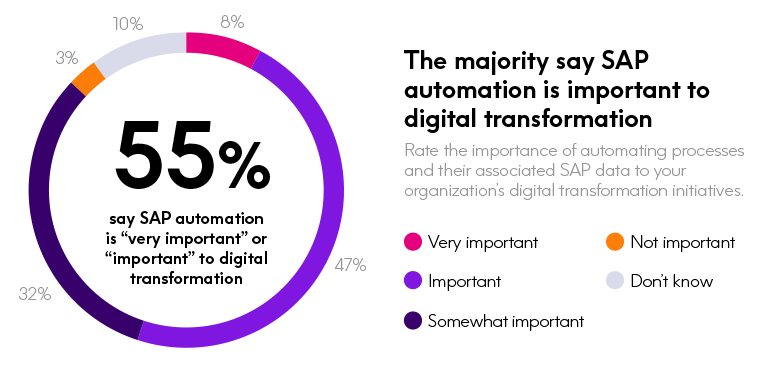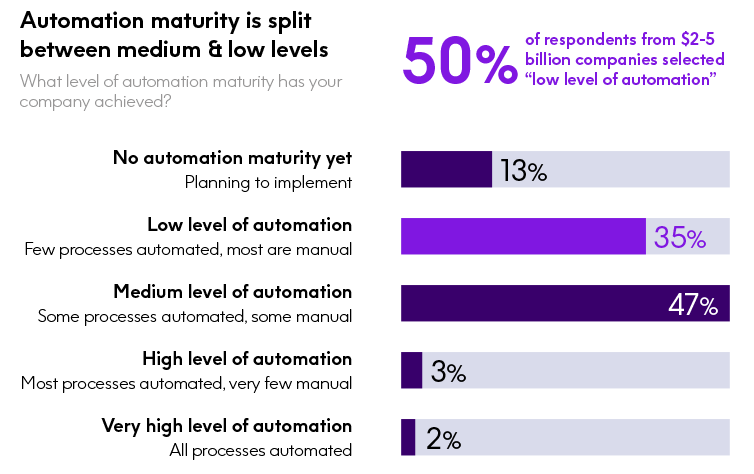SAP automation and digital transformation
Automation plays a key role in digital transformation initiatives overall, enabling organizations to realize the outcomes they need to remain competitive: agility, speed, and improved data quality and integrity. As automation technologies have evolved over the past decade, organizations have come to recognize that employing automation to streamline business processes is an imperative for success.
In our survey, 55% of respondents say that automating SAP processes is “important” or “very important” to digital transformation initiatives. An additional 32% say this automation is “somewhat important”, meaning well over 85% of companies recognize the value of automating their SAP business processes.

At the same time, when we ask about plans to include automating SAP master data processes in digital transformation efforts, 42% say they have not yet defined how or where they will focus on this area of their SAP implementations, and 11% say they will focus only on transactional business processes. However, 31% say their focus is on automating both SAP master data and transactional business processes, while 13% are focusing on automating only SAP master data processes.
Levels of automation maturity
Given that our research also showed that only 5% of companies have achieved a “very high” or “high” level of automation maturity, it is increasingly important to understand how companies are approaching automation and ownership of its adoption. Let’s start by digging deeper into the numbers on automation maturity.
Almost half of respondents (47%) reported a “medium” level of automation maturity, meaning they currently have a mix of automated and manual SAP processes. This aligns with Precisely’s experience delivering SAP automation solutions for over 20 years. Certain processes easily lend themselves to automation, such as mass data management processes like moving, updating, and manipulating SAP master data. Complex, data-intensive business processes involving multiple constituents across an organization are less likely to be automated due to process optimization and reengineering challenges.

Another finding is that automation maturity is related to an organization’s size and industry. Our data shows that smaller companies (between $1 billion and $5 billion in annual revenues) tend to be lower on the maturity scale than larger enterprises. The majority of respondents in the Travel and Transportation and Aerospace and Defense industries rated their automation level as “low,” and about a third (36%) of Life Sciences companies said they are still in the planning stages.
How organizations approach automation: Methods and leadership
In conducting this survey, we also wanted to understand how companies approach automation. The majority (44%) tailor automation decisions on a “case-by-case” basis, employing the most appropriate technology for each use case. Essentially, they appear to take an ad hoc approach, often applying automation technologies that are recommended locally – rather than taking a strategic approach.
Only 13% report adopting a “best-of-breed” approach, where they choose from a vetted list of core automation technologies that can be applied across multiple SAP processes. An additional 13% are focused on taking an “SAP-first” approach that defaults to the automation technologies offered through SAP. This approach may be a hold-over from early automation strategists who believe a single vendor could solve their automation needs. The remaining 28% of respondents are still trying to identify the best automation approach for their organization.

This disparity of approaches may be attributable in part to the differing management roles assigned to lead the automation of SAP processes. While a significant portion of responding organizations (44%) rely on their SAP application management and IT teams to lead their automation efforts, others look to their general IT (20%) or enterprise architecture (15%) teams for implementation. Another group (15%) puts a dedicated digital transformation team or center of excellence in charge of automation across the entire organization.
Read our Report
The 2023 State of SAP Automation Report
Working with the Americas SAP Users Group (ASUG), Precisely conducted a research study to identify the importance, challenges and opportunities that automating complex, data intensive SAP processes presents for enterprises.
We also see some companies that defer their automation decisions to individual business units (17%), while a small minority (10%) do not yet have SAP automation initiatives. This fragmented approach to SAP automation means it is often difficult to identify the owners and decision-makers when it comes to automating SAP processes.
The survey results reveal several trends at play around the importance and adoption of SAP process automation. While automation is recognized as important to improving SAP processes, the disparity of approaches makes adoption in and of itself a challenge.
The different automation maturity levels we see in organizations are driven by organizational size and how the organization approaches automation. In addition, Precisely has observed over the years that the plethora of organizations in charge of SAP automation efforts is another reason that SAP process automation lags behind other application environments in enterprises.
For more on the latest automation trends and insights, and what they mean for your business, read the 2023 State of Automation Report.







